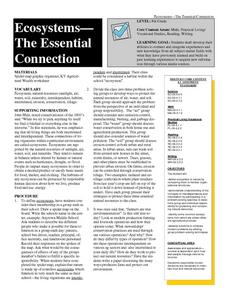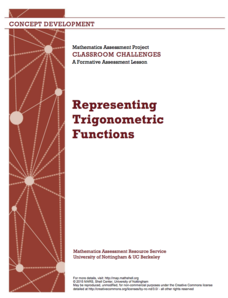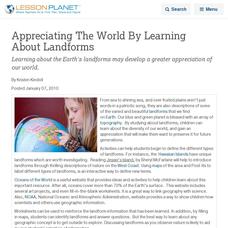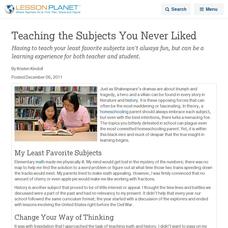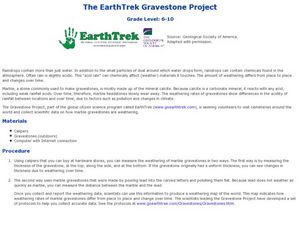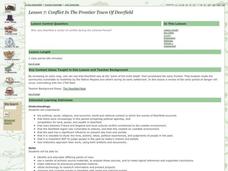Mathematics Assessment Project
Comparing Strategies for Proportion Problems
Having problems with proportions? Then solve these proportion problems with an exercise that asks learners to first individually solve a set of problems involving ratios and proportional reasoning. Groups then discuss provided...
Curated OER
Ecosystems-The Essential Connection
Young scholars develop their abilities to solve problems both in school and in a variety of situations similar to that they have encountered in life. They define the term ecosystem in nature by comparing them to familiar organizational...
Mathematics Assessment Project
Representing Trigonometric Functions
Discover the classic example of periodicity: Ferris wheels. Young mathematicians learn about trigonometric functions through Ferris wheels. They match functions to their graphs and relate the functions to the context.
Mathematics Assessment Project
Sampling and Estimating: Counting Trees
Your task today: count all the trees on a tree farm. To complete the assignment, learners first estimate the number of trees on a tree farm using random sampling. To improve their own response they then evaluate provided...
Mathematics Assessment Project
Classifying Proportion and Non-Proportion Situations
Proportions, proportions, everywhere. Class members complete an assessment task solving problems involving proportionality. They then complete an activity classifying given situations as proportional or non-proportional.
Mathematics Assessment Project
Generalizing Patterns: The Difference of Two Squares
After completing an assessment task where they express numbers as the difference of squares (i.e., 9 = 5^2 – 4^2), class members note any patterns that they see in the problems.
Curated OER
Modeling: Having Kittens
Cats can't add, but they do multiply! Determine the number of descendants of a single cat given specific facts about cats and kittens. The lesson focuses on developing strategies for problem solving using both individual and group work....
Curated OER
The New England Fishing Industry:Sea Changes in a Community
Explore New England's economic and cultural past and possible issues New Englanders will face in the future. Middle and high schoolers research the fishing industry and the need for regulation. They analyze the topography of New England...
Teaching Tolerance
Buddy Share
Here's a project that gives academics the chance to share their opinions on social justice with storytelling, creative writing, or art. Scholars choose what they want to create and are assigned buddies to support their efforts. To...
Teaching Tolerance
Community Spotlight Cards
Not all heroes wear capes—or cleats. Class members identify unsung heroes in their schools or towns for interviews, then create trading cards. A celebration including presentations or trading of cards completes their investigation of...
Curated OER
Appreciating The World By Learning About Landforms
Children can learn about the Earth's landforms and develop a greater appreciation of our world.
Curated OER
Teaching the Subjects You Never Liked
Having to teach your least favorite subjects isn't always fun, but can be a learning experience for both teacher and student.
Curated OER
Month 4
In this alphabetical order and pattern worksheet, learners find the sequence in the letters and write the next letter to complete the pattern. Students use the same letters to make up a different pattern. Learners then draw a map to show...
Curated OER
The Natural State
Following an examination of the Arkansas state quarter, your class will discuss the state's nickname: "The Natural State." They will focus on its abundance of natural resources. Printables for the activities are included.
Curated OER
I. M. Pei and the Geometry of the NGA
Young scholars compare design elements in neoclassical and modern architecture. They review knowledge of triangles and quadrilaterals and design a geometric pattern using Pei's polygons They create a city plan using a variety of lines...
Curated OER
Name That Tune
Students complete a fingerprint oil lab in order to simulate how geologists use the oil and natural gas in rocks to hear sound waves that signify there are oil in those rocks. In this rocks lesson plan, students learn that the rock...
Curated OER
Forward, Into the Past!
Students, during a (virtual) visit to a burial ground, think about the past by viewing tombstones as primary sources. They explain how the attitudes of Deerfield residents toward death and burial evolved from 1780-1880.
Scholastic
Perfect Postcards: California
It's time to hear about some adventures in travel! The Transcontinental Railroad changed life and travel in the United States during the 1800s. Practicing online research skills, pupils discover the features they would like to visit on...
Curated OER
EarthTrek Gravestone Project
Students explore the effects of acid rain. In this acid rain lesson, students investigate the effects of the weathering from acid rain in different places. Students visit cemetaries to collect data about the effects of acid rain on the...
Curated OER
Music Education, The Blues
This lesson examines both the content and form of lyrics in blues songs. In addition to highlighting the basic musical form of a blues song, it also addresses the use of floating verses in blues music, both within the context of the...
Curated OER
Conflict in the Frontier town of Deerfield
Students use primary sources to investigate, explore and represent varying perspectives on the 1704 Deerfield Raid. They consider the reasons Deerfield was at the center of English, French and Native American conflicts in the early 18th...
Curated OER
Sowing Seeds: the Beginning of the Fast Plant Life Cycle
Students plant seeds, observe and tend plants. They identify major plant parts, how to germinate and troubleshoot problems with plants; and, that plants need water, light, and soil nutrients to thrive. They create a Plant Growth Data Log.
Curated OER
Exploring for Petroleum - Modeling an Oil Reserve
Young scholars experiment with locating oil reserves. In this conservation lesson, students use a cardboard box to create sand, rocks, and an oil reserve (water balloon). They use a probe to dig around in the box to find the oil reserve...
Curated OER
Lots of Lakes: Greater Than, Less Than
To set up this activity, your class explores Minnesota's nickname as the Land of 10,000 Lakes, and the back of the state quarter that features a Minnesota lake. Young mathematicians compare the number 1 to the number 10,000 with support...

